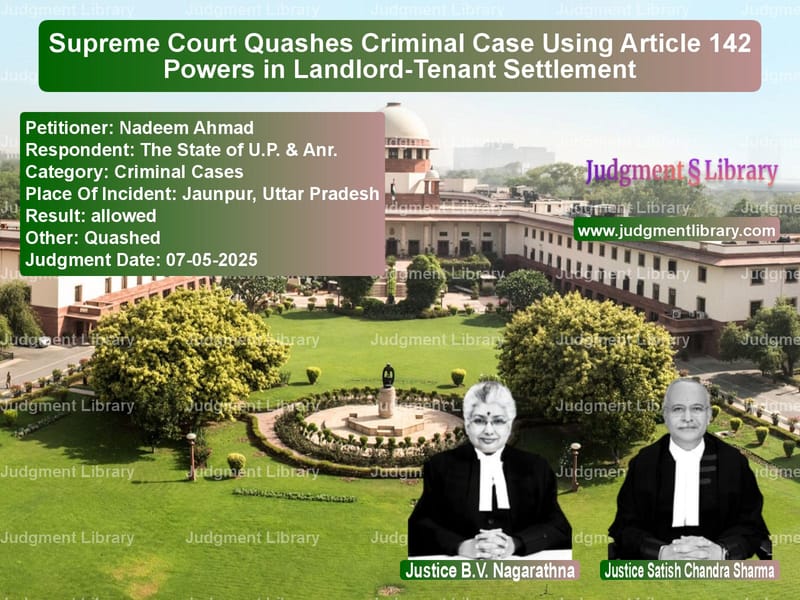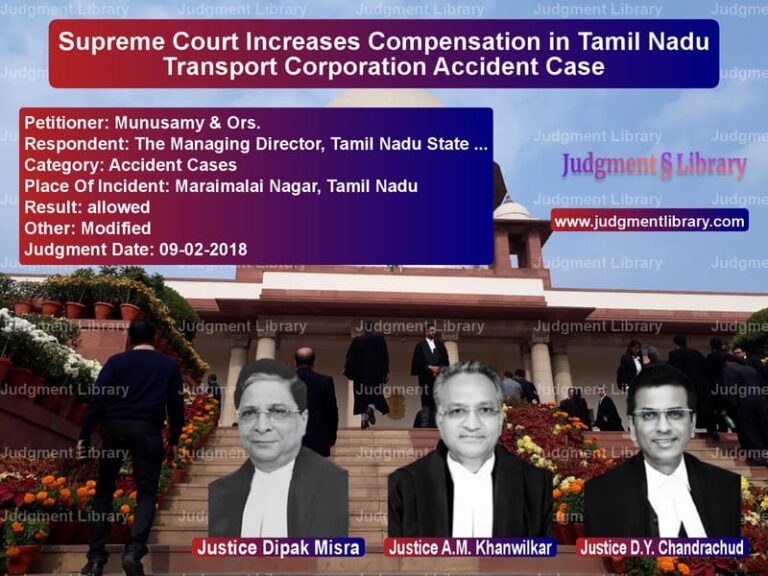Supreme Court Quashes Criminal Case Using Article 142 Powers in Landlord-Tenant Settlement
In a remarkable demonstration of the Indian judiciary’s commitment to restorative justice, the Supreme Court recently exercised its extraordinary constitutional powers to quash criminal proceedings between a landlord and tenant who had reached an amicable settlement. The case, which originated from Jaunpur, Uttar Pradesh, involved multiple criminal charges and civil disputes that had created years of legal entanglement between the parties. What makes this judgment particularly significant is the Court’s willingness to extend its powers beyond the technical limitations of criminal procedure to achieve what it termed “complete justice” between the parties who had decided to end their hostilities and continue their landlord-tenant relationship peacefully.
The legal journey began when Nadeem Ahmad, the appellant, approached the Supreme Court challenging the Allahabad High Court’s order that had refused to quash criminal proceedings against him. The case involved First Information Report (FIR) No. 415 of 2019 registered at Shahganj Police Station in Jaunpur district under various sections of the Indian Penal Code, including some serious non-compoundable offenses. The High Court had dismissed Nadeem Ahmad’s application under Section 482 of the Criminal Procedure Code (CrPC), which seeks to prevent abuse of court process and secure ends of justice, leading to this appeal before the Supreme Court.
The Legal Battle and Settlement
During the pendency of the matter before the Supreme Court, a significant development occurred that would ultimately determine the case’s outcome. The parties—Nadeem Ahmad (the appellant) and the second respondent (the complainant)—arrived at a comprehensive settlement. They decided not to proceed against each other in the various cases they had filed and agreed that the second respondent would continue as Nadeem Ahmad’s tenant, paying rents regularly. This settlement represented a complete resolution of all disputes between them, marking a transformation from legal adversaries to cooperative landlord and tenant.
The appellant’s counsel presented compelling arguments before the Court. Learned counsel for the appellant submitted that during the pendency of this matter before this Court, the parties, namely, the appellant and respondent no.2 herein have arrived at a settlement inasmuch as the parties do not wish to proceed against each other in the cases that they have filed against each other; that respondent no. 2 shall continue to remain as a tenant of the appellant on payment of rents on a regular basis. He further emphasized that in support of their position, both parties had filed affidavits and that they had resolved to end all litigation to continue their relationship peacefully.
The respondent’s counsel fully endorsed these submissions. Learned counsel for respondent no.2 endorsed the submissions made by learned counsel for the appellant and contended that this Court may accept the prayers made by respondent no.2 by treating the same as one being under Section 320 of the Code of Criminal Procedure, 1973 (for short, ‘Crpc’) and consequently grant the relief by exercising powers under Article 142 of the Constitution of India. This alignment between both parties created a unique situation where the complainant himself was seeking quashing of the criminal case he had initially initiated.
The State’s representative adopted a neutral stance, leaving the matter to the Court’s discretion. Learned standing counsel for respondent no.1/State submitted that having regard to the plea made by respondent no.2/complainant and the submissions advanced at the Bar, appropriate orders may be made.
The Application Under Article 142
The core of the case revolved around an application filed under Article 142 of the Constitution of India, which grants the Supreme Court power to pass any decree or order necessary for doing complete justice in any cause or matter pending before it. The application provided detailed information about the comprehensive settlement between the parties.
The application stated: “That the petitioner and respondent No.2 family members have amicably resolved all their disputes and differences, and a settlement agreement dated 03.02.2025 has been entered into between the parties.” It further revealed that multiple civil cases between the parties had already been withdrawn, including a small causes suit regarding arrears of rent and a suit for cancellation of a sale deed.
Most significantly, the application disclosed that the appellant had also lodged a counter case (Case Crime No. 416 of 2019) against the second respondent, which had already been compounded. The application noted: “That the petitioner has lodged Case crime no. 416 of 2019, u/s 323, 504, 506 & 427-IPC against the Respondent No.2 in which petitioner has filed application u/s 320 for compounding of offenses on the basis of settlement arrived between the parties wherein the ACJM Court has compounded the criminal proceedings vide order dated 20.08.2014.”
The applicant emphasized the voluntary nature of the settlement: “That the parties have entered into the settlement voluntarily, without any coercion or undue influence, and in the interest of peace and harmony.” The comprehensive nature of the settlement, covering all pending litigation between the parties, formed the foundation for seeking the extraordinary relief under Article 142.
The Legal Conundrum: Compoundable vs Non-Compoundable Offenses
The case presented a complex legal scenario. The chargesheet included both compoundable offenses (those where the parties can legally settle and withdraw the case) and non-compoundable offenses (those where the law doesn’t permit settlement between parties). Specifically, Sections 323, 504, 427, 447 and 506 of the Indian Penal Code are compoundable under Section 320 of the CrPC, while Sections 307 (attempt to murder) and 324 (voluntarily causing hurt by dangerous weapons) are non-compoundable.
Ordinarily, this would have created an insurmountable legal barrier. The trial court would have had to proceed with the non-compoundable offenses even if the parties had settled their differences. However, the Supreme Court, in its wisdom, recognized that the circumstances warranted extraordinary intervention.
The Supreme Court’s Reasoning and Order
The Supreme Court bench comprising Justice B.V. Nagarathna and Justice Satish Chandra Sharma delivered a nuanced judgment that balanced legal technicalities with the broader objectives of justice. The Court acknowledged that only one case—Case Crime No. 415 of 2019—remained pending between the parties, as all other disputes had been resolved.
The Court’s reasoning centered on the unique circumstances of the case and the comprehensive nature of the settlement. The judges noted: “We find that Sections 323, 504, 427, 447 and 506 of the IPC are compoundable offences as per Section 320 of the CrPC. We find that the chargesheet may have also been filed under Sections 307 and 324 of the IPC which are non-compoundable offences. But having regard to the fact that these offences arise from the same incident and certain of these offences are now being compounded having regard to the prayers made by the respective parties, we find that in exercise of our powers under Article 142 of the Constitution of India, the offences alleged against the appellant herein under Sections 307 and 324 IPC shall also be quashed as the other offences alleged against the appellant herein are compoundable under Section 320 of the CrPC.”
This reasoning demonstrates the Court’s pragmatic approach—recognizing that since the compoundable offenses were being settled and all disputes between the parties had been resolved, continuing with the non-compoundable offenses from the same incident would serve no practical purpose and would only perpetuate unnecessary litigation.
The Court consequently allowed the application filed under Article 142 and passed the final order: “Consequently, we accept the prayers sought for by respondent no.2 and allow the application filed under Article 142 of the Constitution of India. Consequently, the proceedings in Case Crime No.415/2019 under Sections 307, 323, 504, 324, 427, 447 and 506 of the Indian Penal Code, 1860 (IPC), Police Station – Shahganj, District – Jaunpur pending in the Court of learned Judicial Magistrate, Ist Court No.17, Jaunpur stand quashed. As a result, the impugned order is set aside.”
Broader Implications of the Judgment
This judgment carries significant implications for the Indian justice system. First, it reaffirms the Supreme Court’s commitment to using its constitutional powers under Article 142 to achieve substantive justice beyond technical legal constraints. The Court has repeatedly emphasized that Article 142 is a vital tool for delivering complete justice, particularly in cases where the rigid application of law would lead to unjust outcomes.
Second, the judgment recognizes the value of amicable settlements in reducing the burden on an overworked judiciary. By encouraging parties to resolve their disputes mutually and providing legal sanctity to such settlements, the Court promotes alternative dispute resolution mechanisms that can decongest court dockets while preserving relationships.
Third, the approach demonstrates judicial pragmatism in criminal matters involving personal disputes. The Court acknowledged that when parties have genuinely reconciled and settled all their differences, forcing them to continue with criminal litigation, especially for offenses arising from the same transaction where compoundable offenses exist, serves neither the interests of justice nor those of the parties.
However, it’s crucial to understand that the Court’s exercise of power under Article 142 remains discretionary and is typically reserved for exceptional circumstances. The comprehensive nature of the settlement, the resolution of all related disputes, the continuation of the landlord-tenant relationship, and the fact that the complainant himself sought quashing of the case were all determining factors in this judgment.
Conclusion
The Supreme Court’s decision in Nadeem Ahmad vs State of UP represents a balanced approach to criminal justice that values reconciliation and practical resolution over rigid procedural adherence. By exercising its powers under Article 142 of the Constitution, the Court has demonstrated that the ultimate goal of the justice system is to resolve conflicts and restore harmony, particularly when the parties themselves have chosen the path of peace.
This judgment serves as an important precedent for similar cases where parties have settled their disputes comprehensively but face technical legal barriers due to the presence of non-compoundable offenses. It reaffirms the judiciary’s role not merely as an interpreter of law but as an instrument of justice that adapts to the unique circumstances of each case while remaining true to the constitutional mandate of delivering complete justice to all citizens.
The case also highlights the evolving nature of dispute resolution in India, where courts increasingly recognize the value of settlements in appropriate cases, particularly those arising from personal, business, or property relationships that parties wish to preserve despite temporary conflicts. As the Indian justice system continues to evolve, such judgments that balance legal principles with practical justice will play a crucial role in making the system more responsive to the needs of those it serves.
Petitioner Name: Nadeem Ahmad.Respondent Name: The State of U.P. & Anr..Judgment By: Justice B.V. Nagarathna, Justice Satish Chandra Sharma.Place Of Incident: Jaunpur, Uttar Pradesh.Judgment Date: 07-05-2025.Result: allowed.
Don’t miss out on the full details! Download the complete judgment in PDF format below and gain valuable insights instantly!
Download Judgment: nadeem-ahmad-vs-the-state-of-u.p.-&-supreme-court-of-india-judgment-dated-07-05-2025.pdf
Directly Download Judgment: Directly download this Judgment
See all petitions in Fraud and Forgery
See all petitions in Extortion and Blackmail
See all petitions in Theft and Robbery Cases
See all petitions in Landlord-Tenant Disputes
See all petitions in Settlement Agreements
See all petitions in Judgment by B.V. Nagarathna
See all petitions in Judgment by Satish Chandra Sharma
See all petitions in allowed
See all petitions in Quashed
See all petitions in supreme court of India judgments May 2025
See all petitions in 2025 judgments
See all posts in Criminal Cases Category
See all allowed petitions in Criminal Cases Category
See all Dismissed petitions in Criminal Cases Category
See all partially allowed petitions in Criminal Cases Category







